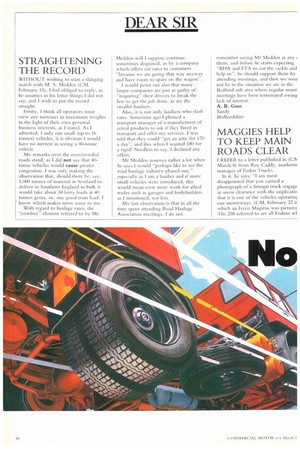STRAIGHTENING THE RECORD
Page 74

If you've noticed an error in this article please click here to report it so we can fix it.
WITHOUT wishing to start a slanging match with M. S. Mcdden (CM. February 15), I feel obliged to reply, as he assumes in his letter things I did not say, and I wish to put the record straight.
Firstly, I think all operators must view any increases in maximum weights in the light of their own personal business interests, as I stated. As I admitted, I only run small (up to 16 tonnes) vehicles, it is obvious I would have no interest in seeing a 40-tonne vehicle.
My remarks over the overcrowded roads stand, as I did not say that 40tonne vehicles would cause greater congestion. I was only making the observation that, should there he, say, 1,000 tonnes of material in Scotland to deliver in Southern England in hulk it would take about 38 lorry loads at 40 tonnes gross, or, one good train load. know which makes more sense to me.
With regard to haulage rates, the "cowboy" element referred to by Mr Medden will I suppose continue, sometimes disguised, as by a company which offers cut rates to customers "because we arc going that way anyway and have room to spare on the wagon".
I would point out also that many larger companies are just as guilty of "requiring" their drivers to break the law to get the job done, as are the smaller hauliers.
Also, it is not only hauliers who slash rates. Sometime ago I phoned a transport manager of a manufacturer of cereal products to ask if they hired in transport and offer my services. I was told that they could "get an artic for £70 a day", and this when I wanted £80 for a rigid! Needless to say, I declined any offers.
Mr Medden assumes rather a lot when he says I would "perhaps like to see the road haulage industry phased out," especially as I am a haulier and if more small vehicles were introduced, this would mean even more work for allied trades such as garages and bodybuilders as I mentioned, not less.
My last observation is that in all the time spent attending Road Haulage Association meetings, I do not remember seeing Mr Medden at any them, and before he starts expecting "RHA and FTA to cut the cackle and help us", he should support them by attending meetings, and then we wou not be in the situation we are in the Bedford sub area where regular rnont meetings have been terminated owing lack of interest.
A. R. Goss Sandy Bed fordshirc






















































































